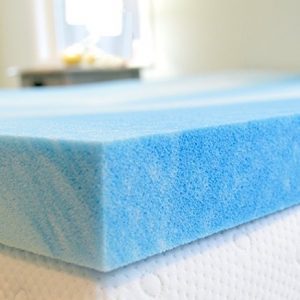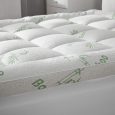For anyone who decides to buy a dorm bed mattress topper, here is how to choose the best mattress topper for dorm bed. Dorm mattresses can feel lumpy or uncomfortable, so adding a mattress topper can help smooth out the surface and provide additional comfort.
When shopping for toppers, there are several factors to consider and these include size, material, firmness and cost.

If you want to make your dorm bed more comfortable, selecting the ideal mattress topper is essential. Many college rooms lack support and often feature uncomfortable, lumpy mattresses with inadequate support which can lead to backaches, neck pain, and other sleep-related discomforts.
Fortunately, there are plenty of ways to increase the comfort level in your college room mattress. One of the most efficient and economical solutions is investing in a mattress topper.
Many available options
If your dorm bed mattress is too firm, soft or has other issues that make it uncomfortable, a mattress topper can make all the difference. There are foam toppers for pillow-top softness; latex toppers add bounce; cooling options if your mattress causes night sweats.
Mattress toppers are thicker than mattress pads and usually come with their own cover. They come in various materials from 2 to 4 inches thick, some with straps so you can anchor them to your mattress, while others simply rest atop.
Topper firmness
Dorm bed mattresses can often be too firm for some college students’ comfort, but mattress toppers make them much more hospitable. Plus, toppers provide additional support which may reduce the incidence of back pain and other discomforts.
Mattress toppers come in various softness levels; from ultra-soft to firm. Depending on your preferences and body weight, a softer topper may be more suitable for side sleepers while stomach or back sleepers should opt for something firmer.
When looking for the ideal mattress topper for a dorm bed, the firmness should be just right; firm enough to prevent sinking too far but not so firm that it doesn’t provide any support. Crafted Beds’ 3-inch thick gel memory foam mattress topper is one such example; it won’t sink too far but still provides just the right amount of give.
The mattress topper for dorm bed should be Durable
College students often spend long hours in their dorm beds, which makes durability important. When selecting a mattress for your college dorm room, durability is key. Toppers are an excellent way to add support and comfort, but make sure you select one that will last.
The lifespan of a topper depends on several factors, including its quality, the amount of weight placed on it, frequency of use and how well it’s maintained. Low-grade products may only last several years before losing their ability to support the body; high-grade items have been known to last up to 8 or 10 years with proper care and maintenance.
The thickness of a topper can affect its longevity. Thinner toppers typically wear out faster than thicker ones, and heavier people may accelerate the deterioration of open cells in memory foam by applying extra pressure to the mattress.
Size of the dorm mattress topper
Finding the ideal mattress topper for your college dorm bed is essential to getting the restful nights you deserve. But make sure you buy the correct size so it fits perfectly and meets all of your requirements.
One of the first steps you should take when purchasing a mattress topper for a dorm bed is measuring its exact dimensions. Most beds come in twin (38″ x 75″) or twin XL configuration (38″ x 80″).
Once you have all this information, you can shop for a college dorm mattress topper that will fit perfectly. Make sure it’s soft enough for back sleepers but firm enough for side and stomach sleepers.
Warrantee
Warranties are an invaluable way to safeguard yourself against buying a mattress that doesn’t meet your expectations. But it’s essential to comprehend the different types of warranties and their duration so you can make an informed decision.
Mattresses are built to last, so it’s essential that you look for a warranty that covers the full lifetime of your purchase. Most warranties won’t cover normal wear and tear or minor cosmetic flaws such as discoloration or scuffing due to aging rather than manufacturer defects; rather, these indications indicate normal increases in use or tear over time.
Many warranties include a trial period of at least 90 days to give you plenty of time to evaluate the mattress. Some companies even provide full year trial periods.



